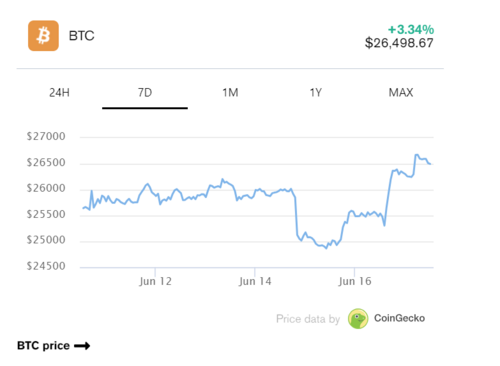Prometheum: What You Need to Know About the SEC’s Poster Child for Crypto Compliance
Prometheum’s co-CEO gave remarks on Capitol Hill that mirrored the SEC’s stance. Now industry observers are poring over the startup’s paper trail.

Under a magnifying glass. Image: Shutterstock
If you’d never heard of the crypto startup Prometheum before this week, you’re far from alone. And yet, seemingly overnight, the company has become the Securities and Exchange Commission’s poster child for compliance—a shining example of regulatory certainty for an industry filled with “hucksters, fraudsters, and scam artists,” according to SEC Chair Gary Gensler.
So what is Prometheum and who’s behind it? Industry observers have been quick to cast aspersions at the startup, scrutinizing the viability and roots of its business after the company’s co-CEO testified before members of Congress on Tuesday.
Describing itself as a market ecosystem for digital asset securities, the firm says it’s the first crypto-centric broker-dealer to register with the SEC while being a member of the Financial Industry Regulatory Authority (FINRA)—and it’s bent on bridging traditional finance to crypto.
To that end, the company’s founder and co-CEO Aaron Kaplan testified before the House Financial Services Committee earlier this week, saying a path to compliance has been clearly laid out by the SEC.
His comments provoked criticism from many members of the digital assets industry, who suggested that Prometheum, a relatively unknown firm, received preferential treatment from regulators for parroting the SEC’s stance and mirroring statements made by Gensler, including that crypto “regulations actually already exist.”
But Kaplan told Decrypt in a statement that the firm’s newly attained regulatory status was the product of hard work.
“Prometheum has been working for years to build a compliant, regulated trading platform for digital asset securities to provide investors the protections afforded under the federal securities laws,” he said. “This is an important step forward for the crypto industry as it shows there is a regulatory pathway to obtain approval.”
As Republican lawmakers continue to hound America’s financial watchdog and Gensler in the wake of enforcement actions against Binance and Coinbase, Prometheum’s apparent success with regulators dovetails nicely with Gensler’s repeated claims that noncompliance is a choice.
Speaking on CNBC last week, SEC Chair Gary Gensler upheld Prometheum as an example of how digital asset firms can come in and register despite what industry players say, while also suggesting that the U.S. doesn’t really need cryptocurrency anyway.
“We have had success, even in the past two weeks,” Gensler said. “A crypto entity filed as what’s called a special purpose broker-dealer and came into compliance that way.”
Yet, Kaplan caught flack from Rep. Mike Flood (R-NE) on Tuesday, who teased out in his questions during the hearing that Prometheum doesn’t currently allow customers to trade Bitcoin and Ethereum. Kaplan said that’s partly because the firm is taking “a crawl-walk-run-approach.”
In May, Prometheum declined to provide Bloomberg with a list of assets it intends to list on its platform, explaining that its offerings will be based on internal decisions as to what qualifies as a security.
Pitchforks come for Prometheum
Since Kaplan gave his remarks on Capitol Hill on Tuesday, Crypto Twitter has been abuzz with users trying to figure out how Prometheum became crypto’s first Gensler-anointed firm, poring over the startup’s paper trail and breaking down its business model—or lack thereof.
The lack of assets supported didn’t sit well with Rodrigo Seira, special counsel at the crypto-focused investment firm Paradigm, who described Prometheum’s alternative trading system as effectively a bicycle with no wheels. He pointed out on Twitter that Prometheum would only be able to facilitate the trade of tokens from projects that first register assets with the SEC.
Seira’s statement was included in a separate, extensive Twitter thread, where Castle Island Ventures’ General Partner Matt Walsh raised other issues with Prometheum, calling it the “strangest thing he’s seen” in a while.
Walsh went as far as to say that the SEC is using Prometheum, a “fringe player with no biz model,” to try and convince Democrats that a Republican-led market structure bill on digital assets should be opposed.
Adam Cochran, a partner at MetaCartel Ventures DAO, also penned an extensive thread centered on Prometheum. He pointed to a Bloomberg article in May that said Prometheum “hasn’t yet gained approval for clearing and settling under [its] broker-dealer license,” meaning customers can’t currently trade digital assets.
Cochran and Walsh both highlighted Prometheum’s connection to two China-affiliated firms: Wanxiang and Network 1 Financial Securities, to which Prometheum has paid over $1.5 million in sales commissions. They pointed out that Network 1 has also faced regulatory actions in the past.

“Even a cursory glance shows that this is not someone you should greenlight, especially not as the first in the space,” Cochran said. “Plants, patsies, or opportunists—it’s unclear, but the fact Gensler is letting them run around with SEC approval is a red flag.”
Cochran’s thread was picked up by Gemini co-founder Tyler Winklevoss, who added his two cents. He drew attention to the fact that Prometheum hasn’t launched a product since it was founded in 2017 and has hired several SEC and FINRA staff.
FINRA filings and New York
Prometheum’s SPBD and ATS registrations can be viewed on BrokerCheck, a website operated by FINRA that provides insight into the financial firms registered with the self-regulatory organization.
Established in 2018, Prometheum’s ATS firm was approved by the SEC in July of 2021, granting it the ability to let “enter, transact, and match orders for digital asset securities” across 53 states and U.S. territories.
The scope of jurisdictions in which Prometheum is able to operate its SPBD business is more limited. According to FINRA, the firm is licensed to operate in 15 different states, including New York, known for its stringent BitLicense regime that regulates digital asset firms under the New York Department of Financial Services (NYDFS).
The company is not currently listed as a registered virtual currency business on the NYDFS’s main page, even though Prometheum’s main offices are situated on Wall Street and the company’s ATS and SBPD firms are registered in New York.
As the digital assets industry and Crypto Twitter keep digging, Marisa Tashman Coppel, policy counsel at the Blockchain Association, ââa crypto industry advocacy group, said on Thursday that Prometheum’s ability to register with the SEC seems suspicious.
She said the Blockchain Association made a request under the Freedom of Information Act, which grants the public access to government documents, seeking documents and communications from the SEC related to Prometheum.
“Although it may take time to receive documents, the law requires the SEC to respond to all FOIA requests,” Coppel said. “Fingers crossed they comply here.”
mcBLOG : Real | No Fakes | www.mcmultimedia.biz








